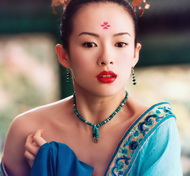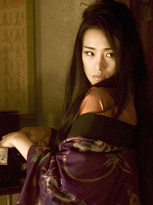Lost in Adaptation
The much anticipated
movie adaptation of Arthur Golde n’s phenomenal 1997 bestseller generated serious heat on its way to the big screen. The storm of pre-publicity was kickstarted when Steven
Spielberg was mooted to direct,
before backing off into a producer’s role, allowing Rob Marshall, fresh from
winning Oscars for Chicago, to step in.
n’s phenomenal 1997 bestseller generated serious heat on its way to the big screen. The storm of pre-publicity was kickstarted when Steven
Spielberg was mooted to direct,
before backing off into a producer’s role, allowing Rob Marshall, fresh from
winning Oscars for Chicago, to step in.
Even before shooting commenced, idealists were bemoaning the casting of two Chinese and a Malaysian as the principle geishas. Gorgeous and talented Japanese actresses must be spitting nails but, even in The Land of the Rising Sun, the radiant Ziyi Zhang and ravishing Gong Li have more box-office pull. That the, incidentally Japanese-owned, studio should cover its expensive bet with a cast of international stars is a marketing no-brainer. It’s also safe to assume the target demographic will mostly watch in blissful ignorance of provincial disparities.
Then there was criticism of the decision to soundtrack the movie in halting, supposedly Japanese-accented English, ensuring the flowing poetic cadences of the native language are lost in translation. The dialogue here – almost always unlikely for Depression-era Japan – presents moments of unintentional mirth. There’s something faintly ridiculous about the spectacle of these talented, eminently watchable actresses mangling their lines (Ziyi Zhang, for example, has only been learning English for the past couple of years).
If you can accept the aforementioned compromises, none is a real deterrent to enjoying this lush period film. Critics, however, have highlighted its ambiguous ethics. Geishas are moulded to conform to a mythical male fantasy object; desires ruthlessly suppressed, dreams unfulfilled. Should Hollywood romanticise female subjugation? Is Memoirs guilty of treating sexual slavery with misty-eyed nostalgia?
“A geisha is not a courtesan,” instructs a legendary practitioner-turned-mentor, played by Michelle Yeoh. “We sell our skills – not our bodies,” she coos, even while training her flowering protégé to attract the best possible price for her virginity at her graduation dance. Fittingly, the cherry-picking highest bidder is an ageing, moneyed letch. 
Operating in a shady grey area of the red-lantern industry, geishas aren’t typical sex workers. They do, however, dedicate themselves to the paid amusement of male customers. It's only with the arrival of the American military that the supermodels of their day find themselves reduced to the status of simple prostitutes. It seems the gum-chewing Yanks have trouble grasping Japanese culture. Funny, that.
The narrative is trammelled into a typical three-act structure (by chick-lit screenwriter Robin Swicord). Sayuri (Zhang) recalls, in mournful voiceover, being sold into servitude and misery as a child; moulded by Mameha (Yeoh) into a celebrated geisha; and sustained against both her rival Hatsumomo’s (Gong) treachery and the vicissitudes of war by her forbidden love for a man (Watanabe).
This mysterious smoke-and-mirrors world has endless cinematic potential and, as expected, Memoirs’ production design doesn’t disappoint. The meticulous re-creation of a 1930s hanamachi district, with its rickety wooden houses, cobblestone alleys and formal teahouses, is a wonder to behold. The sumptuous cinematography, emphasising deep, dark colours, seethes with atmosphere. Shimmering silk and velvet shadows suggest a way of life as foreboding as it is seductive, aptly offset by Yo-Yo Ma’s plaintive cello solos.
The world of the geisha is also one of delicacy and discretion, and here the movie flounders. Forced to paint in broad strokes, the screenplay glosses over myriad character subtleties; and the psychological chess game is reduced to a bitchy cat-fight, compounded by director Marshall's tendency to focus on melodrama over intimacy and emotional excess over restraint.
The acting, however, despite the linguistic wrangling, is astute throughout. Zhang Ziyi (cattily dubbed “little Gong Li” by the Hong Kong media) glows with her customary soulful strength as Sayuri, though she’s written as a willful American teen more than a young Japanese woman; and her strangely avant-garde dance number seems recycled from Madonna's “Drowned World” tour. The stately Yeoh and Ken Watanabe radiate gentle warmth whenever they’re onscreen. 
But Gong Li steals the show as the spiteful diva Hatsumomo. With her soaring cheekbones and vampy drawl, she comes off like an oriental Cruella De Vil with a glacial bitch-slap of a performance, reaffirming that cinema villains have more fun.
An absorbing portrayal of life and longing in a lost and peculiar world, Memoirs of a Geisha boasts exotic window-dressing while its heart pumps to a Hollywood beat. Purists wanting the geisha facts of life can seek out “more truthful films with less gorgeous women and shabbier production values,” as Roger Ebert wrote.
Tinsel-town’s myth-making machine already has the monopoly on beautifully appointed, historically dubious mass-market melodramas.
-- Published by ThaiDay newspaper, 2005